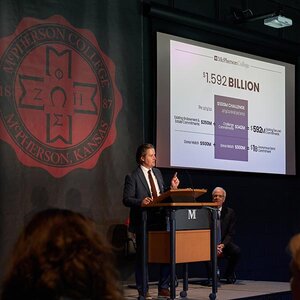Foundations Launch Center to Limit Colleges' Control Over Restricted Gifts
The John William Pope, Marcus, and John Templeton foundations have launched an organization that will advise donors on how to attach legally enforceable conditions to their gifts, the Wall Street Journal reports.
The Indianapolis-based Center for Excellence in Higher Education, as the center will be called, will work to curb colleges' discretion in spending donors' contributions. In addition to the three foundations, which together with the Marcus family have given $57 million to colleges over the last three years, the center is advising a number of other donors on how to put enforceable restrictions on their gifts. At the outset, the center expects to work with donors having $1 million or more to give, though it hasn't established a firm minimum. Tactics promoted by the center include parceling out smaller gifts over a set period of time rather than giving large sums to establish or build an endowment, setting up gifts as an annuity within a trust overseen by a third-party trustee, and providing financial backing to individual professors rather than endowing a permanent chair.
According to Frederic Fransen, the center's executive director, several high-profile battles involving donor intent have inspired the effort. In New Jersey, the Robertson family, heirs to the A&P supermarket fortune, have gone to court asking for the return of a 1961 gift — now valued at more than $800 million — to the Woodrow Wilson School of Public and International Affairs at Princeton University that was intended to support the training of students for foreign service but instead, says the family, was used for other purposes. Similarly, Tulane University in New Orleans and Randolph College in Lynchburg, Virginia, are both in court battling descendants of Josephine Louise Newcomb and Louise Jordan Smith, respectively, over the terms of gifts made decades ago.
While college officials prefer that gifts be unrestricted, which enables them to be used for a host of pressing needs and purposes, donors are in the driver's seat. Still, many experts are concerned that the trend toward putting more conditions on gifts, especially those that pressure faculty to adhere to a particular philosophy or political point of view, is a slippery slope. Among other things, said Robert Kreiser, senior program officer at the American Association of University Professors, such restrictions raise "basic questions about academic freedom and institutional autonomy."





